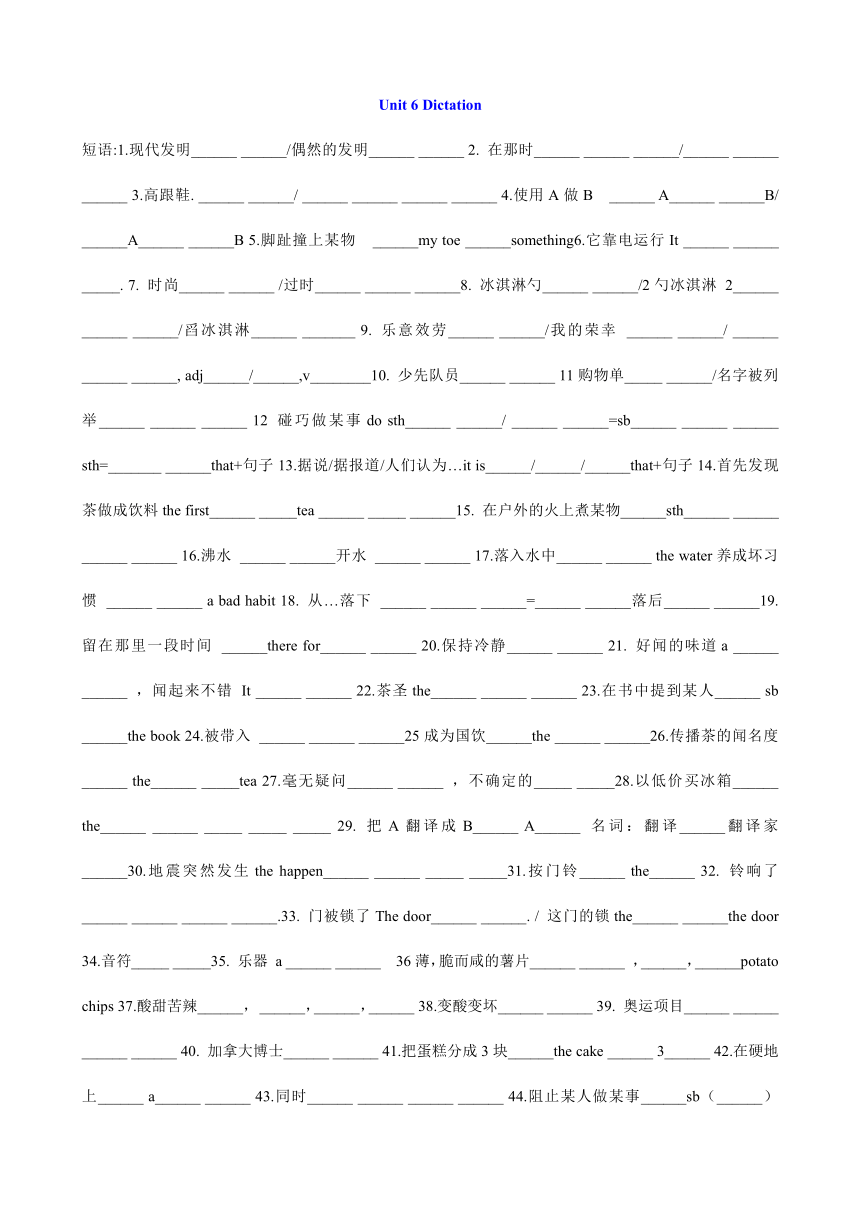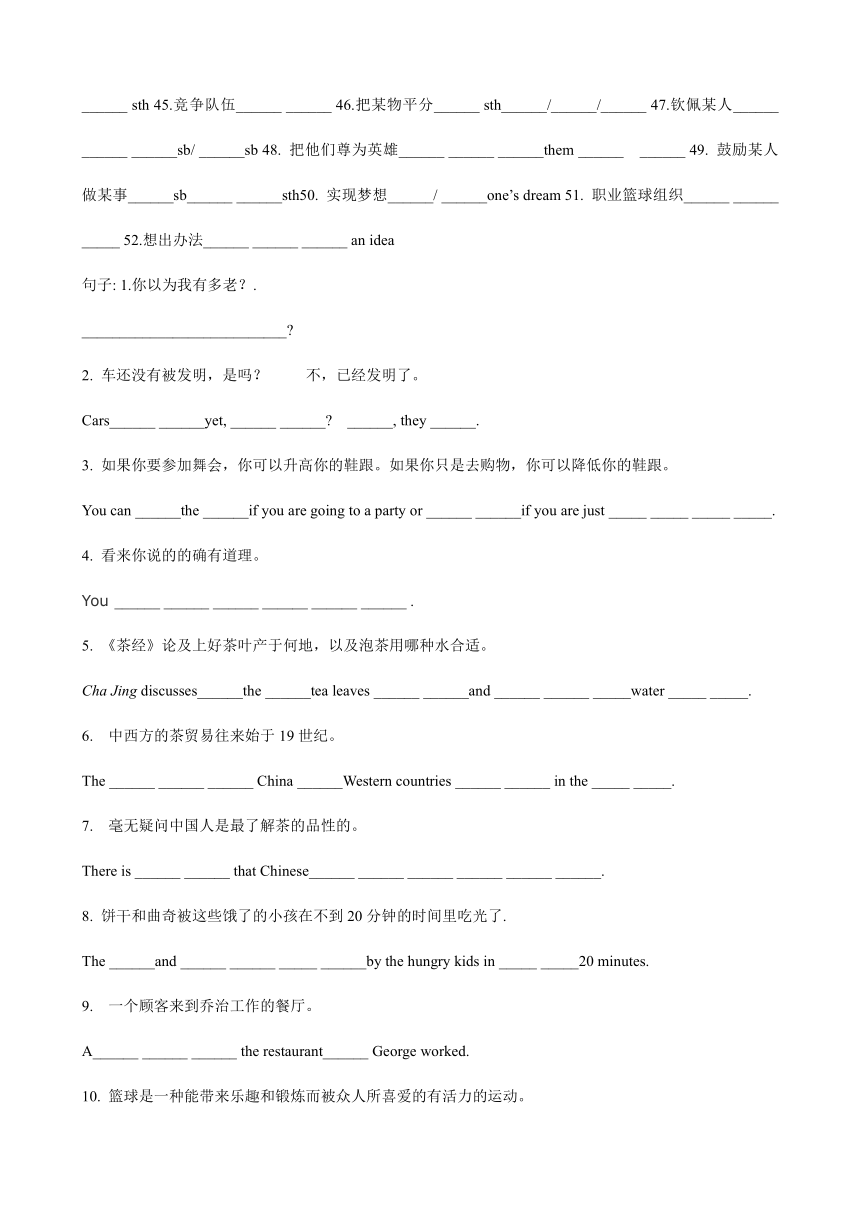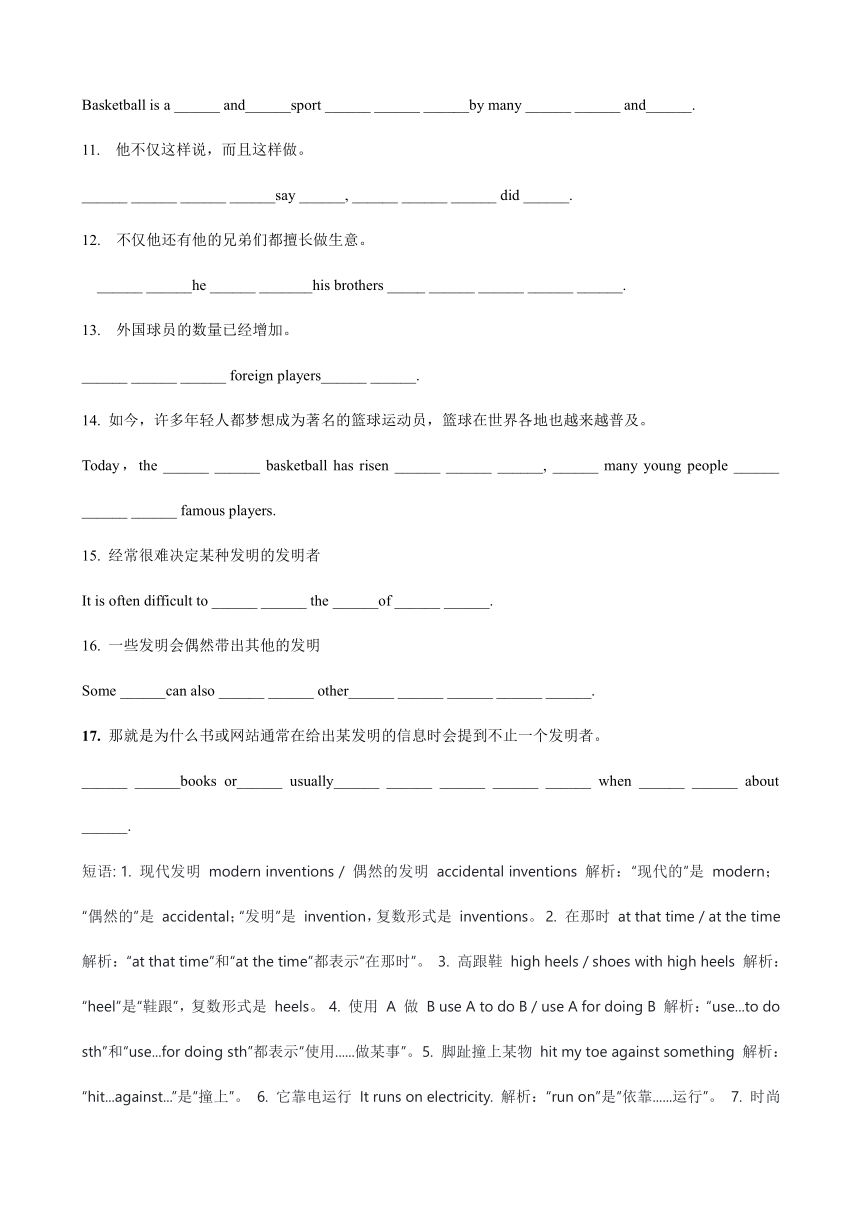周末Unit6 When was it invented?练习(含答案) 人教版九年级英语全册
文档属性
| 名称 | 周末Unit6 When was it invented?练习(含答案) 人教版九年级英语全册 |  | |
| 格式 | docx | ||
| 文件大小 | 28.8KB | ||
| 资源类型 | 教案 | ||
| 版本资源 | 人教新目标(Go for it)版 | ||
| 科目 | 英语 | ||
| 更新时间 | 2024-12-17 10:39:10 | ||
图片预览



文档简介
Unit 6 Dictation
短语:1.现代发明______ ______/偶然的发明______ ______ 2. 在那时______ ______ ______/______ ______ ______ 3.高跟鞋. ______ ______/ ______ ______ ______ ______ 4.使用A做B ______ A______ ______B/ ______A______ ______B 5.脚趾撞上某物 ______my toe ______something6.它靠电运行It ______ ______ _____. 7. 时尚______ ______ /过时______ ______ ______8. 冰淇淋勺______ ______/2勺冰淇淋 2______ ______ ______/舀冰淇淋______ _______ 9. 乐意效劳______ ______/我的荣幸 ______ ______/ ______ ______ ______, adj______/______,v________10. 少先队员______ ______ 11购物单_____ ______/名字被列举______ ______ ______ 12 碰巧做某事do sth______ ______/ ______ ______=sb______ ______ ______ sth=_______ ______that+句子13.据说/据报道/人们认为…it is______/______/______that+句子14.首先发现茶做成饮料the first______ _____tea ______ _____ ______15. 在户外的火上煮某物______sth______ ______ ______ ______ 16.沸水 ______ ______开水 ______ ______ 17.落入水中______ ______ the water养成坏习惯 ______ ______ a bad habit 18. 从…落下 ______ ______ ______=______ ______落后______ ______19. 留在那里一段时间 ______there for______ ______ 20.保持冷静______ ______ 21. 好闻的味道a ______ ______ ,闻起来不错 It ______ ______ 22.茶圣the______ ______ ______ 23.在书中提到某人______ sb ______the book 24.被带入 ______ ______ ______25成为国饮______the ______ ______26.传播茶的闻名度______ the______ _____tea 27.毫无疑问______ ______ ,不确定的_____ _____28.以低价买冰箱______ the______ ______ _____ _____ _____ 29. 把A翻译成B______ A______ 名词:翻译______翻译家 ______30.地震突然发生the happen______ ______ _____ _____31.按门铃______ the______ 32. 铃响了______ ______ ______ ______.33. 门被锁了The door______ ______. / 这门的锁the______ ______the door 34.音符_____ _____35. 乐器 a ______ ______ 36薄,脆而咸的薯片______ ______ ,______,______potato chips 37.酸甜苦辣______, ______,______,______ 38.变酸变坏______ ______ 39. 奥运项目______ ______ ______ ______ 40. 加拿大博士______ ______ 41.把蛋糕分成3块______the cake ______ 3______ 42.在硬地上______ a______ ______ 43.同时______ ______ ______ ______ 44.阻止某人做某事______sb(______)______ sth 45.竞争队伍______ ______ 46.把某物平分______ sth______/______/______ 47.钦佩某人______ ______ ______sb/ ______sb 48. 把他们尊为英雄______ ______ ______them ______ ______ 49. 鼓励某人做某事______sb______ ______sth50. 实现梦想______/ ______one’s dream 51. 职业篮球组织______ ______ _____ 52.想出办法______ ______ ______ an idea
句子: 1.你以为我有多老?.
___________________________
车还没有被发明,是吗? 不,已经发明了。
Cars______ ______yet, ______ ______ ______, they ______.
如果你要参加舞会,你可以升高你的鞋跟。如果你只是去购物,你可以降低你的鞋跟。
You can ______the ______if you are going to a party or ______ ______if you are just _____ _____ _____ _____.
看来你说的的确有道理。
You ______ ______ ______ ______ ______ ______ .
《茶经》论及上好茶叶产于何地,以及泡茶用哪种水合适。
Cha Jing discusses______the ______tea leaves ______ ______and ______ ______ _____water _____ _____.
中西方的茶贸易往来始于19世纪。
The ______ ______ ______ China ______Western countries ______ ______ in the _____ _____.
毫无疑问中国人是最了解茶的品性的。
There is ______ ______ that Chinese______ ______ ______ ______ ______ ______.
饼干和曲奇被这些饿了的小孩在不到20分钟的时间里吃光了.
The ______and ______ ______ _____ ______by the hungry kids in _____ _____20 minutes.
一个顾客来到乔治工作的餐厅。
A______ ______ ______ the restaurant______ George worked.
篮球是一种能带来乐趣和锻炼而被众人所喜爱的有活力的运动。
Basketball is a ______ and______sport ______ ______ ______by many ______ ______ and______.
他不仅这样说,而且这样做。
______ ______ ______ ______say ______, ______ ______ ______ did ______.
不仅他还有他的兄弟们都擅长做生意。
______ ______he ______ _______his brothers _____ ______ ______ ______ ______.
外国球员的数量已经增加。
______ ______ ______ foreign players______ ______.
如今,许多年轻人都梦想成为著名的篮球运动员,篮球在世界各地也越来越普及。
Today,the ______ ______ basketball has risen ______ ______ ______, ______ many young people ______ ______ ______ famous players.
经常很难决定某种发明的发明者
It is often difficult to ______ ______ the ______of ______ ______.
一些发明会偶然带出其他的发明
Some ______can also ______ ______ other______ ______ ______ ______ ______.
那就是为什么书或网站通常在给出某发明的信息时会提到不止一个发明者。
______ ______books or______ usually______ ______ ______ ______ ______ when ______ ______ about ______.
短语: 1. 现代发明 modern inventions / 偶然的发明 accidental inventions 解析:“现代的”是 modern;“偶然的”是 accidental;“发明”是 invention,复数形式是 inventions。 2. 在那时 at that time / at the time 解析:“at that time”和“at the time”都表示“在那时”。 3. 高跟鞋 high heels / shoes with high heels 解析:“heel”是“鞋跟”,复数形式是 heels。 4. 使用 A 做 B use A to do B / use A for doing B 解析:“use...to do sth”和“use...for doing sth”都表示“使用......做某事”。 5. 脚趾撞上某物 hit my toe against something 解析:“hit...against...”是“撞上”。 6. 它靠电运行 It runs on electricity. 解析:“run on”是“依靠......运行”。 7. 时尚 in fashion / 过时 out of fashion 解析:“in fashion”表示“时尚”;“out of fashion”表示“过时”。 8. 冰淇淋勺 an ice-cream scoop / 2 勺冰淇淋 2 scoops of ice cream / 舀冰淇淋 scoop ice cream 解析:“scoop”作名词是“勺”,作动词是“舀”。 9. 乐意效劳 With pleasure / 我的荣幸 My pleasure / It's a pleasure, adj pleasant / please, v please 解析:“With pleasure”“My pleasure”“It's a pleasure”都用于回应别人的感谢;“pleasant”是形容词,“please”作动词时表示“使满意”。 10. 少先队员 Young Pioneer 解析:“Young Pioneer”是固定表达。 11. 购物单 shopping list / 名字被列举 be listed in 解析:“shopping list”是“购物单”;“be listed in”表示“被列举在......”。 12. 碰巧做某事 do sth by accident / by chance = sb happen to do sth = It happened that + 句子 解析:“by accident”和“by chance”都表示“偶然,碰巧”;“happen to do sth”表示“碰巧做某事”。 13. 据说/据报道/人们认为… it is said / reported / believed that + 句子 解析:“said”“reported”“believed”分别是“说”“报道”“认为”的过去分词,用于这种句型。 14. 首先发现茶做成饮料 the first to discover tea as a drink 解析:“the first to do sth”表示“第一个做某事的”。 15. 在户外的火上煮某物 cook sth over an open fire outdoors 解析:“over an open fire”是“在户外的火上”;“outdoors”是“在户外”。 16. 沸水 boiling water 开水 boiled water 解析:“boiling water”是正在沸腾的水;“boiled water”是煮开过的水。 17. 落入水中 fall into the water 养成坏习惯 fall into a bad habit 解析:“fall into”是“落入,陷入”。 18. 从…落下 fall off = drop off 落后 fall behind 解析:“fall off”和“drop off”都表示“从......落下”;“fall behind”表示“落后”。 19. 留在那里一段时间 stay there for some time 解析:“stay”是“停留”;“some time”表示“一段时间”。 20. 保持冷静 keep calm 解析:“keep + 形容词”表示“保持......状态”。 21. 好闻的味道 a nice smell,闻起来不错 It smells nice. 解析:“smell”作名词是“味道”,作动词是“闻起来”。 22. 茶圣 the saint of tea 解析:“saint”是“圣人”。 23. 在书中提到某人 mention sb in the book 解析:“mention”是“提到”。 24. 被带入 be brought into 解析:“be brought into”是被动语态,表示“被带入”。 25. 成为国饮 become the national drink 解析:“national”是“国家的”;“drink”作名词有“饮料”的意思。 26. 传播茶的闻名度 spread the popularity of tea 解析:“spread”是“传播”;“popularity”是“名气,受欢迎程度”。 27. 毫无疑问 without doubt ,不确定的 unsure 解析:“without doubt”是固定短语;“unsure”是“不确定的”。 28. 以低价买冰箱 buy the fridge at a low price 解析:“at a low price”表示“以低价”。 29. 把 A 翻译成 B translate A into B 名词:翻译 translation 翻译家 translator 解析:“translate...into...”是“把......翻译成......”;“translation”是名词“翻译”;“translator”是“翻译家”。 30. 地震突然发生 the earthquake happened all of a sudden 解析:“all of a sudden”是“突然”。 31. 按门铃 ring the doorbell 解析:“ring”有“按铃”的意思。 32. 铃响了 The bell rang out. 解析:“ring out”是“响起”。 33. 门被锁了 The door was locked. / 这门的锁 the lock of the door 解析:“locked”是“lock”的过去分词,表被动;“the lock of...”表示“......的锁”。 34. 音符 musical note 解析:“musical”是“音乐的”;“note”是“音符”。 35. 乐器 a musical instrument 解析:“musical”是“音乐的”;“instrument”是“乐器”。 36. 薄,脆而咸的薯片 thin, crispy and salty potato chips 解析:“thin”是“薄的”;“crispy”是“脆的”;“salty”是“咸的”。 37. 酸甜苦辣 sweet, sour, bitter, hot 解析:分别对应“甜”“酸”“苦”“辣”。 38. 变酸变坏 go sour 解析:“go + 形容词”表示“变得......”。 39. 奥运项目 Olympic events 解析:“Olympic”是“奥林匹克的”;“event”是“项目”,复数形式是 events。 40. 加拿大博士 Canadian doctor 解析:“Canadian”是“加拿大的”。 41. 把蛋糕分成 3 块 divide the cake into 3 pieces 解析:“divide...into...”是“把......分成......”;“piece”是“块”。 42. 在硬地上 on a hard ground 解析:“on”表示“在......上”;“hard”是“硬的”;“ground”是“地面”。 43. 同时 at the same time 解析:固定短语。 44. 阻止某人做某事 stop sb (from) doing sth 解析:“stop...from doing sth”表示“阻止......做某事”。 45. 竞争队伍 competing teams 解析:“competing”是“竞争的”。 46. 把某物平分 divide sth equally / fairly / evenly 解析:“equally”“fairly”“evenly”都有“平均地”的意思。 47. 钦佩某人 look up to sb / admire sb 解析:“look up to”和“admire”都有“钦佩”的意思。 48. 把他们尊为英雄 look up to them as heroes 解析:“look up to...as...”是“把......尊为......”。 49. 鼓励某人做某事 encourage sb to do sth 解析:“encourage”是“鼓励”。 50. 实现梦想 achieve / realize one’s dream 解析:“achieve”和“realize”都有“实现”的意思。 51. 职业篮球组织 professional basketball organization 解析:“professional”是“职业的”;“organization”是“组织”。 52. 想出办法 come up with an idea 解析:“come up with”是“想出”。 句子: 1. 你以为我有多老? How old do you think I am 解析:这是一个特殊疑问句,“do you think”是插入语。 2. 车还没有被发明,是吗? 不,已经发明了。 Cars haven't been invented yet, have they No, they have. 解析:这是现在完成时的被动语态的否定句和反意疑问句,回答根据实际情况,发明了用肯定回答。 3. 如果你要参加舞会,你可以升高你的鞋跟。如果你只是去购物,你可以降低你的鞋跟。 You can raise the heels if you are going to a party or lower them if you are just going shopping. 解析:“raise”是“升高”;“lower”是“降低”;“go shopping”是“去购物”。 4. 看来你说的的确有道理。 You do seem to have a point. 解析:“seem to do sth”是“似乎做某事”。 5. 《茶经》论及上好茶叶产于何地,以及泡茶用哪种水合适。 Cha Jing discusses where the finest tea leaves were produced and what kind of water was suitable for making tea. 解析:“discuss”是“讨论,论述”;“be produced”是“被生产,产于”;“suitable for”是“适合......”。 6. 中西方的茶贸易往来始于 19 世纪。 The trade of tea between China and Western countries began in the 19th century. 解析:“trade”是“贸易”;“between...and...”是“在......和......之间”;“begin”是“开始”,过去式是 began。 7. 毫无疑问中国人是最了解茶的品性的。 There is no doubt that Chinese have the best understanding of the nature of tea. 解析:“There is no doubt that...”是“毫无疑问......”;“have the best understanding of...”是“对......有最好的了解”。 8. 饼干和曲奇被这些饿了的小孩在不到 20 分钟的时间里吃光了. The biscuits and cookies were eaten up by the hungry kids in less than 20 minutes. 解析:“be eaten up”是“被吃光”;“less than”是“少于”。 9. 一个顾客来到乔治工作的餐厅。 A customer came to the restaurant where George worked. 解析:这是一个定语从句,“where”引导定语从句修饰先行词“restaurant”。 10. 篮球是一种能带来乐趣和锻炼而被众人所喜爱的有活力的运动。 Basketball is a lively and enjoyable sport that is loved by many for fun and exercise. 解析:“lively”是“有活力的”;“enjoyable”是“令人愉快的”;“that is loved...”是定语从句修饰“sport”。 11. 他不仅这样说,而且这样做。 Not only did he say so, but also he did so. 解析:“not only...but also...”连接两个句子时,前半句要部分倒装。 12. 不仅他还有他的兄弟们都擅长做生意。 Not only he but also his brothers are good at doing business. 解析:“not only...but also...”连接两个主语时,谓语动词遵循“就近原则”。 13. 外国球员的数量已经增加。 The number of foreign players has increased. 解析:“the number of...”表示“......的数量”,作主语时,谓语动词用单数。 14. 如今,许多年轻人都梦想成为著名的篮球运动员,篮球在世界各地也越来越普及。 Today, the popularity of basketball has risen around the world, and many young people dream of becoming famous players. 解析:“the popularity of...”是“......的普及度,受欢迎程度”;“dream of doing sth”是“梦想做某事”。 15. 经常很难决定某种发明的发明者 It is often difficult to decide the inventor of some inventions. 解析:“it is + 形容词 + to do sth”是固定句型;“inventor”是“发明者”。 16. 一些发明会偶然带出其他的发明 Some inventions can also lead to other inventions by accident. 解析:“lead to”是“导致,引出”。 17. 那就是为什么书或网站通常在给出某发明的信息时会提到不止一个发明者。 That's why books or websites usually mention more than one inventor when giving information about an invention. 解析:“That's why...”是“那就是为什么......”;“mention”是“提到”;“more than”是“超过,不止”。
短语:1.现代发明______ ______/偶然的发明______ ______ 2. 在那时______ ______ ______/______ ______ ______ 3.高跟鞋. ______ ______/ ______ ______ ______ ______ 4.使用A做B ______ A______ ______B/ ______A______ ______B 5.脚趾撞上某物 ______my toe ______something6.它靠电运行It ______ ______ _____. 7. 时尚______ ______ /过时______ ______ ______8. 冰淇淋勺______ ______/2勺冰淇淋 2______ ______ ______/舀冰淇淋______ _______ 9. 乐意效劳______ ______/我的荣幸 ______ ______/ ______ ______ ______, adj______/______,v________10. 少先队员______ ______ 11购物单_____ ______/名字被列举______ ______ ______ 12 碰巧做某事do sth______ ______/ ______ ______=sb______ ______ ______ sth=_______ ______that+句子13.据说/据报道/人们认为…it is______/______/______that+句子14.首先发现茶做成饮料the first______ _____tea ______ _____ ______15. 在户外的火上煮某物______sth______ ______ ______ ______ 16.沸水 ______ ______开水 ______ ______ 17.落入水中______ ______ the water养成坏习惯 ______ ______ a bad habit 18. 从…落下 ______ ______ ______=______ ______落后______ ______19. 留在那里一段时间 ______there for______ ______ 20.保持冷静______ ______ 21. 好闻的味道a ______ ______ ,闻起来不错 It ______ ______ 22.茶圣the______ ______ ______ 23.在书中提到某人______ sb ______the book 24.被带入 ______ ______ ______25成为国饮______the ______ ______26.传播茶的闻名度______ the______ _____tea 27.毫无疑问______ ______ ,不确定的_____ _____28.以低价买冰箱______ the______ ______ _____ _____ _____ 29. 把A翻译成B______ A______ 名词:翻译______翻译家 ______30.地震突然发生the happen______ ______ _____ _____31.按门铃______ the______ 32. 铃响了______ ______ ______ ______.33. 门被锁了The door______ ______. / 这门的锁the______ ______the door 34.音符_____ _____35. 乐器 a ______ ______ 36薄,脆而咸的薯片______ ______ ,______,______potato chips 37.酸甜苦辣______, ______,______,______ 38.变酸变坏______ ______ 39. 奥运项目______ ______ ______ ______ 40. 加拿大博士______ ______ 41.把蛋糕分成3块______the cake ______ 3______ 42.在硬地上______ a______ ______ 43.同时______ ______ ______ ______ 44.阻止某人做某事______sb(______)______ sth 45.竞争队伍______ ______ 46.把某物平分______ sth______/______/______ 47.钦佩某人______ ______ ______sb/ ______sb 48. 把他们尊为英雄______ ______ ______them ______ ______ 49. 鼓励某人做某事______sb______ ______sth50. 实现梦想______/ ______one’s dream 51. 职业篮球组织______ ______ _____ 52.想出办法______ ______ ______ an idea
句子: 1.你以为我有多老?.
___________________________
车还没有被发明,是吗? 不,已经发明了。
Cars______ ______yet, ______ ______ ______, they ______.
如果你要参加舞会,你可以升高你的鞋跟。如果你只是去购物,你可以降低你的鞋跟。
You can ______the ______if you are going to a party or ______ ______if you are just _____ _____ _____ _____.
看来你说的的确有道理。
You ______ ______ ______ ______ ______ ______ .
《茶经》论及上好茶叶产于何地,以及泡茶用哪种水合适。
Cha Jing discusses______the ______tea leaves ______ ______and ______ ______ _____water _____ _____.
中西方的茶贸易往来始于19世纪。
The ______ ______ ______ China ______Western countries ______ ______ in the _____ _____.
毫无疑问中国人是最了解茶的品性的。
There is ______ ______ that Chinese______ ______ ______ ______ ______ ______.
饼干和曲奇被这些饿了的小孩在不到20分钟的时间里吃光了.
The ______and ______ ______ _____ ______by the hungry kids in _____ _____20 minutes.
一个顾客来到乔治工作的餐厅。
A______ ______ ______ the restaurant______ George worked.
篮球是一种能带来乐趣和锻炼而被众人所喜爱的有活力的运动。
Basketball is a ______ and______sport ______ ______ ______by many ______ ______ and______.
他不仅这样说,而且这样做。
______ ______ ______ ______say ______, ______ ______ ______ did ______.
不仅他还有他的兄弟们都擅长做生意。
______ ______he ______ _______his brothers _____ ______ ______ ______ ______.
外国球员的数量已经增加。
______ ______ ______ foreign players______ ______.
如今,许多年轻人都梦想成为著名的篮球运动员,篮球在世界各地也越来越普及。
Today,the ______ ______ basketball has risen ______ ______ ______, ______ many young people ______ ______ ______ famous players.
经常很难决定某种发明的发明者
It is often difficult to ______ ______ the ______of ______ ______.
一些发明会偶然带出其他的发明
Some ______can also ______ ______ other______ ______ ______ ______ ______.
那就是为什么书或网站通常在给出某发明的信息时会提到不止一个发明者。
______ ______books or______ usually______ ______ ______ ______ ______ when ______ ______ about ______.
短语: 1. 现代发明 modern inventions / 偶然的发明 accidental inventions 解析:“现代的”是 modern;“偶然的”是 accidental;“发明”是 invention,复数形式是 inventions。 2. 在那时 at that time / at the time 解析:“at that time”和“at the time”都表示“在那时”。 3. 高跟鞋 high heels / shoes with high heels 解析:“heel”是“鞋跟”,复数形式是 heels。 4. 使用 A 做 B use A to do B / use A for doing B 解析:“use...to do sth”和“use...for doing sth”都表示“使用......做某事”。 5. 脚趾撞上某物 hit my toe against something 解析:“hit...against...”是“撞上”。 6. 它靠电运行 It runs on electricity. 解析:“run on”是“依靠......运行”。 7. 时尚 in fashion / 过时 out of fashion 解析:“in fashion”表示“时尚”;“out of fashion”表示“过时”。 8. 冰淇淋勺 an ice-cream scoop / 2 勺冰淇淋 2 scoops of ice cream / 舀冰淇淋 scoop ice cream 解析:“scoop”作名词是“勺”,作动词是“舀”。 9. 乐意效劳 With pleasure / 我的荣幸 My pleasure / It's a pleasure, adj pleasant / please, v please 解析:“With pleasure”“My pleasure”“It's a pleasure”都用于回应别人的感谢;“pleasant”是形容词,“please”作动词时表示“使满意”。 10. 少先队员 Young Pioneer 解析:“Young Pioneer”是固定表达。 11. 购物单 shopping list / 名字被列举 be listed in 解析:“shopping list”是“购物单”;“be listed in”表示“被列举在......”。 12. 碰巧做某事 do sth by accident / by chance = sb happen to do sth = It happened that + 句子 解析:“by accident”和“by chance”都表示“偶然,碰巧”;“happen to do sth”表示“碰巧做某事”。 13. 据说/据报道/人们认为… it is said / reported / believed that + 句子 解析:“said”“reported”“believed”分别是“说”“报道”“认为”的过去分词,用于这种句型。 14. 首先发现茶做成饮料 the first to discover tea as a drink 解析:“the first to do sth”表示“第一个做某事的”。 15. 在户外的火上煮某物 cook sth over an open fire outdoors 解析:“over an open fire”是“在户外的火上”;“outdoors”是“在户外”。 16. 沸水 boiling water 开水 boiled water 解析:“boiling water”是正在沸腾的水;“boiled water”是煮开过的水。 17. 落入水中 fall into the water 养成坏习惯 fall into a bad habit 解析:“fall into”是“落入,陷入”。 18. 从…落下 fall off = drop off 落后 fall behind 解析:“fall off”和“drop off”都表示“从......落下”;“fall behind”表示“落后”。 19. 留在那里一段时间 stay there for some time 解析:“stay”是“停留”;“some time”表示“一段时间”。 20. 保持冷静 keep calm 解析:“keep + 形容词”表示“保持......状态”。 21. 好闻的味道 a nice smell,闻起来不错 It smells nice. 解析:“smell”作名词是“味道”,作动词是“闻起来”。 22. 茶圣 the saint of tea 解析:“saint”是“圣人”。 23. 在书中提到某人 mention sb in the book 解析:“mention”是“提到”。 24. 被带入 be brought into 解析:“be brought into”是被动语态,表示“被带入”。 25. 成为国饮 become the national drink 解析:“national”是“国家的”;“drink”作名词有“饮料”的意思。 26. 传播茶的闻名度 spread the popularity of tea 解析:“spread”是“传播”;“popularity”是“名气,受欢迎程度”。 27. 毫无疑问 without doubt ,不确定的 unsure 解析:“without doubt”是固定短语;“unsure”是“不确定的”。 28. 以低价买冰箱 buy the fridge at a low price 解析:“at a low price”表示“以低价”。 29. 把 A 翻译成 B translate A into B 名词:翻译 translation 翻译家 translator 解析:“translate...into...”是“把......翻译成......”;“translation”是名词“翻译”;“translator”是“翻译家”。 30. 地震突然发生 the earthquake happened all of a sudden 解析:“all of a sudden”是“突然”。 31. 按门铃 ring the doorbell 解析:“ring”有“按铃”的意思。 32. 铃响了 The bell rang out. 解析:“ring out”是“响起”。 33. 门被锁了 The door was locked. / 这门的锁 the lock of the door 解析:“locked”是“lock”的过去分词,表被动;“the lock of...”表示“......的锁”。 34. 音符 musical note 解析:“musical”是“音乐的”;“note”是“音符”。 35. 乐器 a musical instrument 解析:“musical”是“音乐的”;“instrument”是“乐器”。 36. 薄,脆而咸的薯片 thin, crispy and salty potato chips 解析:“thin”是“薄的”;“crispy”是“脆的”;“salty”是“咸的”。 37. 酸甜苦辣 sweet, sour, bitter, hot 解析:分别对应“甜”“酸”“苦”“辣”。 38. 变酸变坏 go sour 解析:“go + 形容词”表示“变得......”。 39. 奥运项目 Olympic events 解析:“Olympic”是“奥林匹克的”;“event”是“项目”,复数形式是 events。 40. 加拿大博士 Canadian doctor 解析:“Canadian”是“加拿大的”。 41. 把蛋糕分成 3 块 divide the cake into 3 pieces 解析:“divide...into...”是“把......分成......”;“piece”是“块”。 42. 在硬地上 on a hard ground 解析:“on”表示“在......上”;“hard”是“硬的”;“ground”是“地面”。 43. 同时 at the same time 解析:固定短语。 44. 阻止某人做某事 stop sb (from) doing sth 解析:“stop...from doing sth”表示“阻止......做某事”。 45. 竞争队伍 competing teams 解析:“competing”是“竞争的”。 46. 把某物平分 divide sth equally / fairly / evenly 解析:“equally”“fairly”“evenly”都有“平均地”的意思。 47. 钦佩某人 look up to sb / admire sb 解析:“look up to”和“admire”都有“钦佩”的意思。 48. 把他们尊为英雄 look up to them as heroes 解析:“look up to...as...”是“把......尊为......”。 49. 鼓励某人做某事 encourage sb to do sth 解析:“encourage”是“鼓励”。 50. 实现梦想 achieve / realize one’s dream 解析:“achieve”和“realize”都有“实现”的意思。 51. 职业篮球组织 professional basketball organization 解析:“professional”是“职业的”;“organization”是“组织”。 52. 想出办法 come up with an idea 解析:“come up with”是“想出”。 句子: 1. 你以为我有多老? How old do you think I am 解析:这是一个特殊疑问句,“do you think”是插入语。 2. 车还没有被发明,是吗? 不,已经发明了。 Cars haven't been invented yet, have they No, they have. 解析:这是现在完成时的被动语态的否定句和反意疑问句,回答根据实际情况,发明了用肯定回答。 3. 如果你要参加舞会,你可以升高你的鞋跟。如果你只是去购物,你可以降低你的鞋跟。 You can raise the heels if you are going to a party or lower them if you are just going shopping. 解析:“raise”是“升高”;“lower”是“降低”;“go shopping”是“去购物”。 4. 看来你说的的确有道理。 You do seem to have a point. 解析:“seem to do sth”是“似乎做某事”。 5. 《茶经》论及上好茶叶产于何地,以及泡茶用哪种水合适。 Cha Jing discusses where the finest tea leaves were produced and what kind of water was suitable for making tea. 解析:“discuss”是“讨论,论述”;“be produced”是“被生产,产于”;“suitable for”是“适合......”。 6. 中西方的茶贸易往来始于 19 世纪。 The trade of tea between China and Western countries began in the 19th century. 解析:“trade”是“贸易”;“between...and...”是“在......和......之间”;“begin”是“开始”,过去式是 began。 7. 毫无疑问中国人是最了解茶的品性的。 There is no doubt that Chinese have the best understanding of the nature of tea. 解析:“There is no doubt that...”是“毫无疑问......”;“have the best understanding of...”是“对......有最好的了解”。 8. 饼干和曲奇被这些饿了的小孩在不到 20 分钟的时间里吃光了. The biscuits and cookies were eaten up by the hungry kids in less than 20 minutes. 解析:“be eaten up”是“被吃光”;“less than”是“少于”。 9. 一个顾客来到乔治工作的餐厅。 A customer came to the restaurant where George worked. 解析:这是一个定语从句,“where”引导定语从句修饰先行词“restaurant”。 10. 篮球是一种能带来乐趣和锻炼而被众人所喜爱的有活力的运动。 Basketball is a lively and enjoyable sport that is loved by many for fun and exercise. 解析:“lively”是“有活力的”;“enjoyable”是“令人愉快的”;“that is loved...”是定语从句修饰“sport”。 11. 他不仅这样说,而且这样做。 Not only did he say so, but also he did so. 解析:“not only...but also...”连接两个句子时,前半句要部分倒装。 12. 不仅他还有他的兄弟们都擅长做生意。 Not only he but also his brothers are good at doing business. 解析:“not only...but also...”连接两个主语时,谓语动词遵循“就近原则”。 13. 外国球员的数量已经增加。 The number of foreign players has increased. 解析:“the number of...”表示“......的数量”,作主语时,谓语动词用单数。 14. 如今,许多年轻人都梦想成为著名的篮球运动员,篮球在世界各地也越来越普及。 Today, the popularity of basketball has risen around the world, and many young people dream of becoming famous players. 解析:“the popularity of...”是“......的普及度,受欢迎程度”;“dream of doing sth”是“梦想做某事”。 15. 经常很难决定某种发明的发明者 It is often difficult to decide the inventor of some inventions. 解析:“it is + 形容词 + to do sth”是固定句型;“inventor”是“发明者”。 16. 一些发明会偶然带出其他的发明 Some inventions can also lead to other inventions by accident. 解析:“lead to”是“导致,引出”。 17. 那就是为什么书或网站通常在给出某发明的信息时会提到不止一个发明者。 That's why books or websites usually mention more than one inventor when giving information about an invention. 解析:“That's why...”是“那就是为什么......”;“mention”是“提到”;“more than”是“超过,不止”。
同课章节目录
- Unit 1 How can we become good learners.
- Section A
- Section B
- Unit 2 I think that mooncakes are delicious!
- Section A
- Section B
- Unit 3 Could you please tell me where the restroom
- Section A
- Section B
- Unit 4 I used to be afraid of the dark.
- Section A
- Section B
- Unit 5 What are the shirts made of?
- Section A
- Section B
- Review of Units 1-5
- Unit 6 When was it invented?
- Section A
- Section B
- Unit 7 Teenagers should be allowed to choose their
- Section A
- Section B
- Unit 8 It must belong to Carla.
- Section A
- Section B
- Unit 9 I like music that I can dance to.
- Section A
- Section B
- Unit 10 You're supposed to shake hands.
- Section A
- Section B
- Review of Units 6-10
- Unit 11 Sad movies make me cry.
- Section A
- Section B
- Unit 12 Life is full of the unexpected
- Section A
- Section B
- Unit 13 We're trying to save the earth!
- Section A
- Section B
- Unit 14 I remember meeting all of you in Grade 7.
- Section A
- Section B
- Review of Units 11-14
